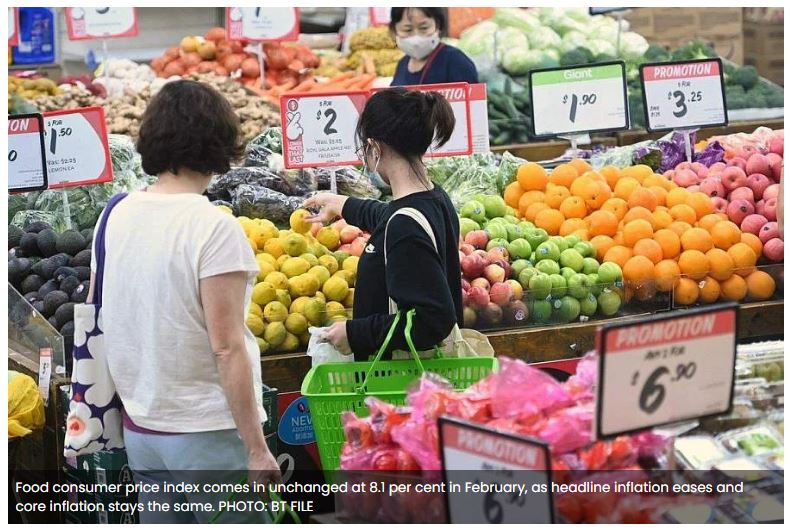Singapore headline inflation eases to 6.3% in February; core holds steady at 5.5%
SINGAPORE’S headline inflation dipped in February, while core inflation was unchanged from the previous month, data from the Monetary Authority of Singapore (MAS) and Ministry of Trade and Industry (MTI) showed on Thursday (Mar 23). Both, however, were lower than economist estimates.
In February, headline inflation slipped to 6.3 per cent, from 6.6 per cent in the previous month, mainly due to lower private-transport inflation.
Core inflation, which excludes accommodation and private transport, remained unchanged from January’s 5.5 per cent – the highest since November 2008. This came as lower services inflation was broadly offset by higher inflation for retail and other goods, as well as electricity and gas.
Private-sector economists expected a marginally higher rate of headline inflation at 6.4 per cent, and a higher rate of 5.8 per cent for core inflation, going by median estimates in a Bloomberg poll.
Unlike in the previous report, where the authorities expected prices of energy commodities to remain elevated, they noted that prices have declined recently. However, they added that regional inflation will remain supported by resilient growth in Asia.
MAS and MTI did not discuss the domestic outlook for the cost of utilities in the latest inflation release. Previously, they said utilities prices will likely remain elevated despite coming down from their peak in Q3 2022.
Domestically, unit labour costs are still projected to rise further – though in the latest report, MAS and MTI no longer note that this will happen alongside robust wage growth.
The authorities maintained their inflation outlook for 2023. February’s headline inflation remained within the official range of between 5.5 and 6.5 per cent. Core inflation for the month remained higher than the official full-year projection of 3.5 to 4.5 per cent.
Overall, consumer price index was mixed across categories in February.
Electricity and gas inflation was up at 12.1 per cent, from 11.5 per cent in January, due to a larger increase in electricity costs.
Also higher was retail and other goods, which was up at 3.8 per cent, against the preceding month’s 3.3 per cent. This was on account of the step-up in tobacco excise duty and a faster pace of increase in the prices of personal care products and recreational and cultural goods.
In contrast, private transport inflation, at 12.1 per cent, was lower than the 14.3 per cent recorded in January. The slowdown was the result of a smaller increase in car prices and a decline in petrol prices.
Services inflation eased to 3.9 per cent, from 4.2 per cent in the month before, on the back of lower airfares.
Accommodation inflation edged down to 4.9 per cent, from 5 per cent previously, as housing rents rose more slowly.
On the bread and butter front, food inflation was unchanged at 8.1 per cent, as a steeper increase in non-cooked food prices was offset by a smaller increase in the prices of prepared meals.
Except for the changes above, MAS and MTI largely maintained their outlook from the previous month’s release, noting that imported inflation is expected to remain firm, on the back of continued elevated global food commodities prices and high core inflation in major advanced economies.
They still expect that amid resilient demand, businesses will continue to pass on accumulated import, labour and other costs to consumers. They noted that car and accommodation price increases will stay firm.
“Taking into account all factors, MAS Core Inflation is expected to stay above 5 per cent year-on-year in Q1 2023, as previously projected,” they said.
Source: https://www.businesstimes.com.sg/singapore/singapore-headline-inflation-eases-63-february-core-holds-steady-55


 English
English




